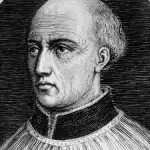Thomas Becket of England
Thomas Becket was a statesman and clergyman in 12th Century England. A powerful personality who challenged a king who had once been his friend, Becket is remembered far more for the manner of his death than what he achieved in life. 
Becket was born on Dec. 21, 1118, in London. His father, a wealthy merchant and former Sheriff of London, and his mother had moved to England from Normandy a few years before. Young Thomas's parents gave their son a good education. He learned to read at Merton Abbey and, sometime later, was sent off to the University of Paris to do further study. Intelligent, eager to learn, and a supreme administrator, he found employment as the secretary of several officials, including Richer de l'Aigle and Osbert Huitdeniers. In 1141, when Thomas was 23, he went to work for Theobald of Bec, the Archbishop of Canterbury. Theobald recognized Becket's industriousness, sanctioned his desire to study law in France and Italy, and eventually named him his most trusted clerk. Theobald named Becket a deacon in 1154 and then made him Archdeacon of Canterbury. Becket represented England on several high-profile missions to Rome. 
In that same year, King Stephen of England died and was succeeded by King Henry II. Impressed by Becket's industriousness, Henry named Becket his chancellor. The two men found much in common, including a love of hawking, hunting, and the outdoors; and Becket became one of the most powerful men in the kingdom. Becket fought in several battles that Henry's forces won against French armies and advised the king on nearly every matter of public policy for a number of years. Henry even sent his oldest son, known as Young Henry, to live with Becket for a time. Archbishop of Canterbury Theobald died in 1161. The man who held this position was the head of the Catholic Church in England. Henry, looking to gain more sway over church matters, appointed Becket to succeed Theobald, figuring that he and his friend would continue to see eye-to-eye on such issues. Becket at first refused, saying that Henry would not be appreciate some decisions that Becket would be forced to make as head of the church, but, as in many things, Henry would not be dissuaded. Becket eventually accepted and was ordained a priest on June 2, 1162, and then, the very next day, ordained as a bishop and then consecrated as Archbishop of Canterbury. The ceremony and the appointment it represented had a profound effect on Becket. Known for his lavish lifestyle, he forsook the trappings of luxury and adopted the adornments of the clergy, including wearing simple clothes, studying the scriptures, and uttering constant prayers. He also resigned as Chancellor to the king. 
Becket and Henry–both proud, strong-willed, and convinced of their own righteousness–began to have disagreements and misunderstandings. One of the first was an act by Becket of open resistance to a new system of taxation instituted by Henry. In the past, landowners had paid a sort of "protection money" to avoid paying further taxes. Henry ordered this money to be paid directly into the royal coffers; Becket, as head of the Church, a large landowner, spoke out against this change, resulting in a heated argument between the two men. Another, which would have much more lasting impact, was the pronouncement that Becket was the head of the church and that, in that capacity, he, not Henry, was charged with punishing clergymen. One clergyman in particular, Philip de Brois, was tried in a church court on a charge of murder and acquitted by the judge, the bishop of Lincoln; he was, however, sentenced to pay a fine to the relatives of the deceased. Henry wasn't satisfied with that outcome and ordered the man to be tried in a civil court, on the same murder charge. The king at this time was trying to roll back the set of events that directly preceded his ascension to the throne. During a period of nearly two decades, a civil war had torn the country apart. Stephen had claimed the throne after his uncle, Henry I, died, in violation of Henry's wishes, which were to have his daughter Matilda succeed him. Both Henry and Matilda (known variously as Queen Maud and the Empress Matilda) had large numbers of men fighting for them, and it wasn't until most of the loved ones of both had gone that a peace was established, resulting in the ascension of Matilda's son, Henry, at Stephen's death. The period was known as The Anarchy because lawlessness was rampant. Faced with a continued challenge to his authority, Stephen adopted many practices that were questioned by his supporters. In the case of Henry II, he wanted to return the country–particularly its appreciation of the monarchy–to the understanding that had been in place when his grandfather, King Henry I, had been on the throne. In 1164, Henry proposed a new set of rules, the Constitutions of Clarendon, a series of 16 declarations that re-emphasized the primacy of the monarchy and set out what he defined as "the ancient customs of the realm." The net effect of this, as far as Becket was concerned, was a limiting of the church's jurisdiction over crimes committed by clergymen. |
|




